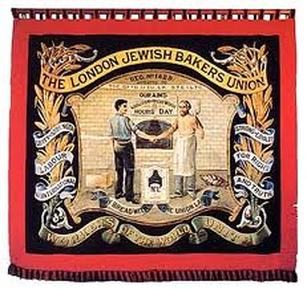 Banner of London Jewish Bakers Union, c.1926
Banner of London Jewish Bakers Union, c.1926 Thirty people were killed in the massive strike and boycott. It was the conflict that set the tone for relations between labor unions, employers and government in the United States for the century that followed.
It is ironic — perhaps tragic — that Labor Day has come to be more associated with sales at retail stores than with the labor movement that gave birth to it. As many as a quarter of all Americans now work in the retail industry. Labor Day, for them, is one of the busiest days of the year — far from a day of rest that honors workers.
The history of the labor movement in the United States is inextricably linked to the history of Jews in America. The vast majority of the Jews who came to this country in the late 19th and early 20th centuries were working class men and women who were employed in industries — notably the garment industry — that had a history of exploiting workers with sweatshop conditions, low pay, and of putting children to work in adult jobs. Jewish Americans fought for workers rights, not just out of a theoretical attachment to the values of the labor movement, but out of self-interest and to improve their lives and the lives of their family members.
Yet, there also is a strong link between the principles of Judaism and the ideals that the labor movement struggles to defend. The Torah teaches the basic moral basis for treating workers with dignity: "You shall not abuse needy and destitute workers, whether fellow countrymen or strangers within the communities of your land … else they will cry to Adonai against you and you will incur guilt" (Deuteronomy 24:14-15). Our tradition, which allies itself with the cause of the oppressed against the oppressor, supports the idea that the individually powerless can act collectively to even the scales of power.
Tomorrow, members of the congregation I serve will join with members of other local faith communities to demonstrate support for the Coalition of Immokalee Workers. The CIW is made up of Florida farmworkers who pick about half of all the tomatoes sold in the United States. The CIW has been remarkably successful in using collective action to thwart inhumane treatment in the fields, including a history of modern-day slavery. (A dozen people are now serving sentences in federal prisons for enslaving Florida farm workers).
International food suppliers, supermarket chains, and restaurants — like Aramark, McDonalds, Burger King, Subway, Whole Foods and Trader Joe's — have signed agreements spurred by the CIW to buy tomatoes only from growers that pledge safe working conditions. In addition, the agreements call for an extra "penny per pound" for farmworkers for the tomatoes they pick. In this way the CIW is working to end the cycle of poverty caused by lower-than-minimum-wage pay for farmworkers that has not increased in thirty years.
Tomorrow, thoughtful and dedicated members of our community will be urging Publix, the largest supermarket chain in Florida, to make the moral choice and join with others in the food industry to stop selling the products of slavery and exploitation. What a perfect way to spend Labor Day — much better than a shopping spree.
American Jews can identify with the kind of oppression suffered by today's farmworkers. We can empathize, because many of our grandparents and great-grandparents experienced something similar. What is more, we know from thousands of years of reading Torah that we have an obligation to remember that we were once slaves and that we, therefore, must join in the cause of the downtrodden to improve the lives of all.
Other Posts on This Topic:
Slavery in Florida (And Why It's Bad for the Jews)
Vayakhel: Being Part of Something Bigger

 RSS Feed
RSS Feed
